The Philosophy of Unschooling, A New Way Of Learning
What happens when children are free from the restraints of traditional education?
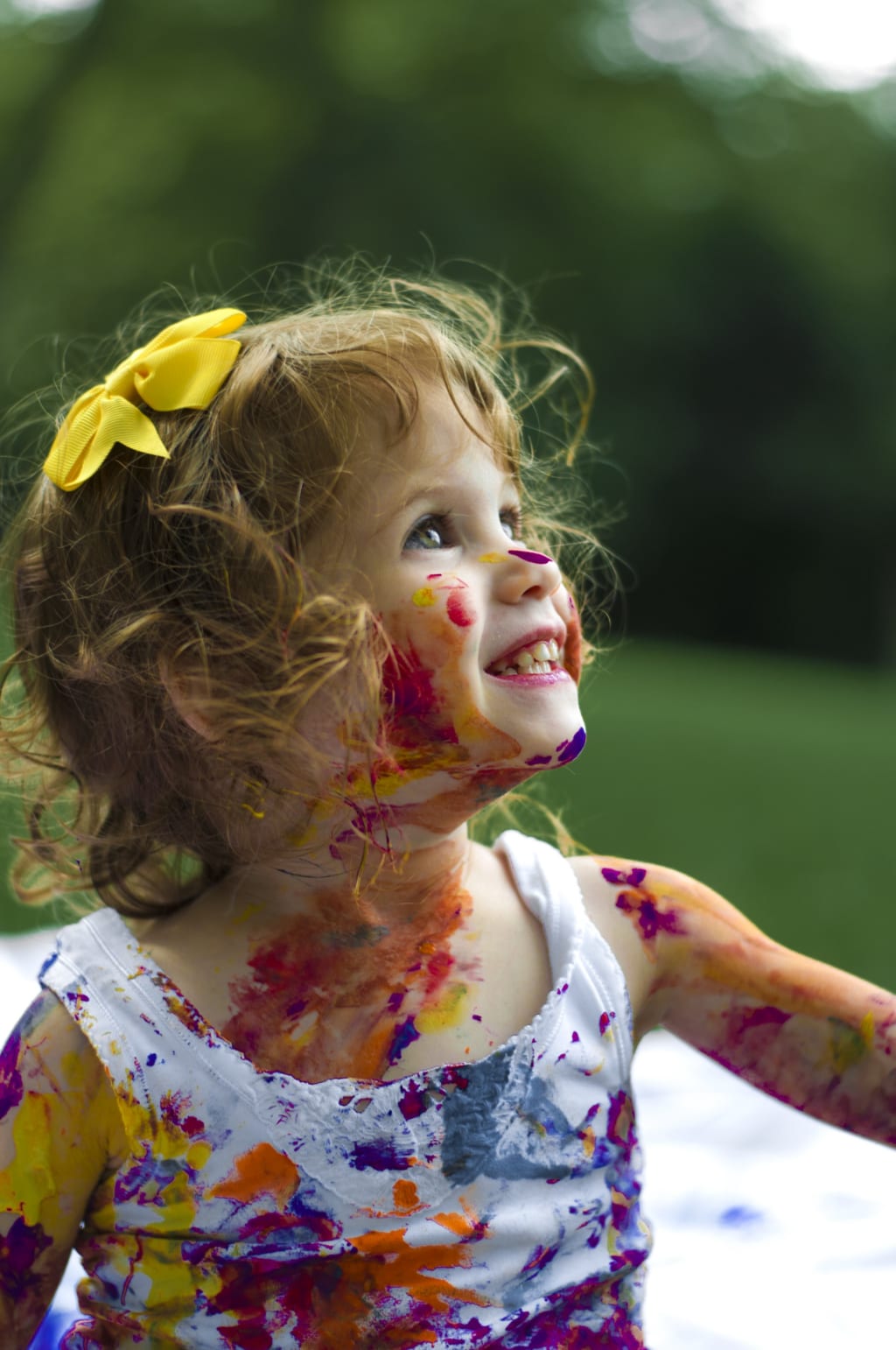
No homework. No rules. No teachers. No tests.
There is no typical school day for the Olsons, a family of six from Massachusetts. On any given day, the 15-year-old twins could be researching theatre costumes for their acting program, while their 12-year-old daughter, who is passionate about fitness, could be training on the ninja course she built in their backyard.
This is because the Olsons practice unschooling, a type of homeschooling guided by a child's interests and curiosity rather than a predetermined curriculum.
"They are not doing anything because they are motivated to get a good grade; they learn about things because they are deeply interested in them," says mom Nicole Olson.
A movement is launched
John Holt, a Vermont educator and author, is credited with starting the unschooling movement. After working as a teacher in private schools in the late 1970s, Holt began advocating for self-directed learning for children. He developed an educational philosophy centered on allowing children to learn based on their interests and motivations, with the idea that learning is a natural process that occurs all the time.
Frequently described as one of the most radical educational philosophies, unschooling permits children to learn through their natural curiosity, outside of the constraints of the traditional education system.
The city is our curriculum. We believe that kids learn by living in the world around them, so we immerse them in that world. - Kerry McDonald, mother of 4 unschooled children.
There are no lessons or strict curriculums, with supporters of the philosophy casting doubt on the value of the traditional education curricula, set times for learning, conventional grading methods, standardized tests, forced contact with children their age group, and the obligation to do homework.
Yet, this seemingly unstructured approach to education is not as outlandish as it appears. After all, unschooling's primary component, free play, has received widespread support as an educational method. In a recent study of a group of six to seven-year-olds, researchers from the University of Colorado discovered that the more time children spent in less organized activities, the better they were at "self-directed executive functioning."
Essentially, the term "self-directed executive functioning" is a fancy way of saying children, rather than adults, choose what they will do and when.
A study published in the journal Frontiers in Psychology found that children who spent more time doing less organized activities had a more developed self-directed executive function. This includes planning, making decisions, managing information, switching tasks, and suppressing unwanted thoughts and feelings.
Children who spent more time in structured activity, on the other hand, showed a decline in their ability to set goals, make decisions, and self-regulate.
How do unschooled children learn?
Unschooling encourages personalized learning by allowing students to choose what they want to learn and how they want to learn it. It is an active learning method, with the parents responsible for providing an environment that encourages the learner's inherent curiosity. This could include activities and support that promote this curiosity to discover new things.
Coming from a traditional education mindset, this may seem daunting, but some make it work.
Maleka Diggs, an unschooling advocate, is the founder of Eclectic Learning Network, a support and coaching organization for homeschooling families of color. As a mother of two unschooled daughters, Diggs has spent years developing a parenting and education strategy that values young people's views and contributions while emphasizing critical thinking and open discussions about challenging subjects. She states:
"The access points to learning are so many, and in school, they don't really value all the multiple pathways to learning." For example, Diggs says, you can do "an entire lesson in a supermarket and cover all core subjects, just with a supermarket run. Home education, no matter what you define it as, can look any way you want it to."
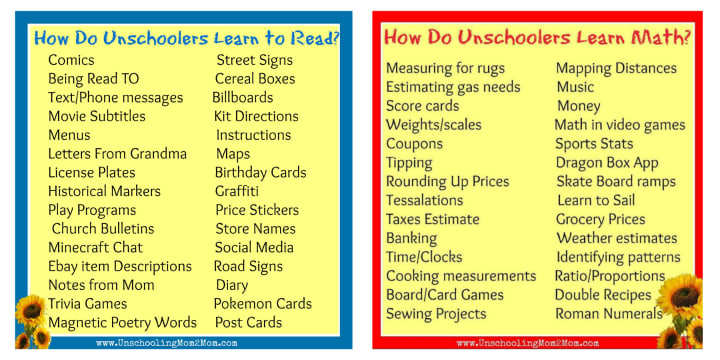
Furthermore, unschooling does not abide by the strict 9 am - 3 pm learning schedule you find in most modern schools. The key reason being, the acquisition of knowledge happens all the time and everywhere. The brain does not cease working when the school bell rings. Therefore the day cannot be divided into learning times and non-learning periods.
As such, unschooling families look for ways to include learning in everyday activities. Going to the grocery store, practicing ballet, visiting the doctor, and doing household chores such as changing the smoke alarm batteries or the air filter provide opportunities for children to learn. While textbooks are generally not used in unschooling, children are encouraged to utilize the library, work experience, film, video games, gardening, traveling, museums, nature, and social interactions with friends and family to facilitate their passion for learning.

However, such a free approach to learning can have detrimental effects. Sandra Martin-Chang, a professor of Education at Concordia University, has met with parents who, for fear of being accused of coercion, refuse to point out intriguing things or provide instruction on subjects that their children freely indicate interest in. Instead, the parents urge that the children seek out the knowledge on their own. This can be extremely tough in some circumstances. Learning to speak, for example, is natural and hard-wired, but reading and writing are not.
"I've worked with 7-year-olds who don't know the alphabet. And that's heartbreaking … [The parents] say, 'My child didn't start reading until they were 12, but then they read with passion and purpose.' But their child has missed out on all those years of print exposure, and it's very difficult to make up for it."
Traditional education system
The modern education system was established in Prussia. It consisted of an eight-year primary education program that provided the fundamental technical skills required in a modernizing world, such as reading and writing. Additionally, music and Christian religious education in close collaboration with the churches and attempted to impose a strict ethos of duty, sobriety, and discipline.
There is no denying the Prussian system played a vital role in social change and the reduction in illiteracy over the past two centuries. However, in the 21st century, some question whether such a one-size-fits-all approach to learning is still appropriate for today's children.
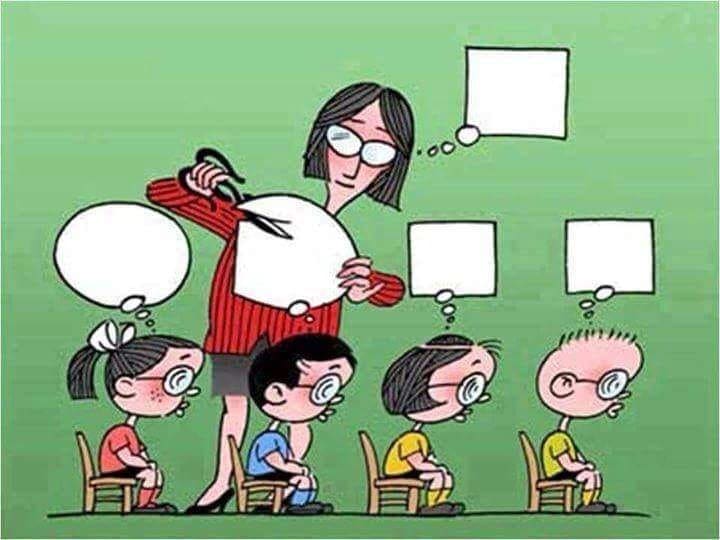
Unschooling fosters an environment where children can explore their interests and learn at their own pace, as opposed to traditional courses and particular assignments that must be completed by a set time, in a set way.
The philosophy considers that children have different learning styles, with unique preferences for acquiring new information. In the modern system, teachers rarely can evaluate each student for their learning style. And while teachers do occasionally test out different learning methods, they are not employed with a particular child in mind.
Such education freedom is highly advantageous to special needs children, those on the autistic spectrum, and intellectually gifted kids. Instead of requiring a child to complete government-imposed educational requirements, there is the opportunity to acquire significant talents in areas they are interested in.
Marike Reid-Gaudet, President of the Quebec Association for Home Education, believes that unschooling allows children to discover themselves and explore further into their interests, rather than those imposed by the school.
Now an adult, Reid-Gaudet's son Loic dropped out of school - and the curriculum - after Grade 1, opting instead to study philosophy, history, and Japanese.
"My role was to bring him to a Chinese buffet - no, an international buffet - where the child is exposed to so many things to taste and experience. Then he will affirm his own tastes and passions, and in the end, we see the individual emerge. It makes for young people who know what they like and don't like, and are not blasé about learning."
Loic's educational journey may sound like an idyllic experience, but some detractors contend that the principles of unschooling directly oppose scientific results. When pupils don't know much about a topic, explicit instruction performs considerably better than exploration learning. Learning involves effort, and many young people may opt not to put forth that effort if they do not have to.
Furthermore, while giving children a choice can encourage them, they cannot learn about unfamiliar subjects. They must be exposed to new topics in an appealing manner, mainly when they are young and ready to learn about the world to discover new interests. However, giving pupils more choice and liberty once they understand a topic and skills could work.
Life after unschooling
With the amount of independence and control unschooled children have, it may come as no surprise that many start their own businesses. Unschoolers can cultivate interests and passions outside of a coercive classroom or regular school-at-home atmosphere, allowing them to blossom into full-fledged careers.
As a matter of fact, in a 2013 study conducted by psychologists Peter Gray and Gina Riley, more than half of the grown unschoolers interviewed worked as entrepreneurs. Many interviewees said their occupations were directly related to their childhood interests, which they continued into adulthood.
Case in point, Karen Leong became an unschooled student when her parents removed her from the educational system after Leong failed to show interest in her lessons in Primary 2. Leong thrived under the new method and followed a variety of activities.
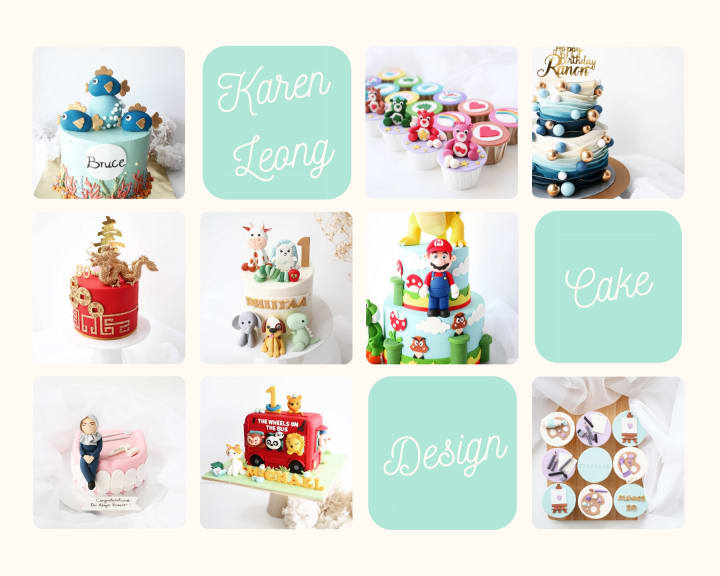
At the age of 11, she became fascinated with cake decorating when she came across it on YouTube. She went on to take cake design classes, which allowed her to turn her hobby into a business. Leong is now a successful bespoke cake designer who started her own business at 19.
What the critics are saying
The critics of unschooling believe it to be an extreme educational ideology that can lead to the negligence of unschooled children, the absence of social skills, structure, discipline, and the student's ability to cope with uncomfortable situations. Skills that are vital to the life of a productive member of society.
According to defenders of traditional education, unschooled children miss out on the discipline, emotional boundaries, and social structure present in regular schools. Some children may experience educational gaps due to a lack of motivation or behavioral or learning issues.
When turning to the parents of unschoolers, not everyone is cut out for such an exceptional task. With everything having the potential of becoming a learning opportunity, unschooling can feel intense and draining. Parents continuously conduct research, take their children out for hands-on learning, and focus on their children's needs. As a result, it can be too exhausting for certain families, depending on the number of children and other family commitments.
As such, some unschooled children do not read or reach other significant literacy and numeracy milestones until far later than the norm for their age, if at all. Kellie Rolstad and her husband Jeff MacSwan, both professors in the Arizona State University's Faculty of Education, are unschooling their three children. Skye, their 11-year-old son, only learned to tie his shoes in his eleventh year, has never written in cursive, and recently requested a refresher on writing a basic numeral.
"This morning, he was writing a date and said to me, 'Now, which way does a 2 go?' Some people would find that frightening - he's 11 years old and doesn't know how to make a 2. But I'm not frightened."
Like other unschooling parents, Kellie Rolstad claims she isn't afraid because all of her children are well-adjusted and thrive in whatever challenge, academic or otherwise, they choose to undertake.
However, several experts are concerned about the long-term consequences of this technique, particularly given the scarcity of empirical data on the subject. The majority of unschooling studies are anecdotal; there are no large-scale studies that demonstrate its effectiveness.
One recent study published in the Canadian Journal of Behavioural Science by Concordia University and Mount Allison University found that unschooled children scored lower for academic ability in reading, writing, and arithmetic than homeschooled children who followed a structured curriculum. However, only 12 unschooled children were included in the study.
Similarly, Peter Trifonas, an associate professor in the curriculum, teaching, and learning department at the University of Toronto's Ontario Institute for Studies in Education, is concerned about the absence of empirical evidence.
"I'm really uncomfortable with leaving anything open to a blind ignorance and faith that things will go right."
Parents of unschoolers, according to Dr. Trifonas, risk restricting their child's options. He points out that schools expose pupils to a wide range of disciplines and themes for study, including some that a youngster would not come across in the usual run of things.
Are you thinking of giving it a go?
It's important to note that unschooling is not appropriate for all children. Some kids thrive in a structured atmosphere and cannot cope with the stress of having to make their own educational decisions.
Each child and family are unique, so you'll have to decide based on your circumstances. If you're considering unschooling, make sure you have the time to devote to this vital responsibility and consider the social and educational ramifications.
About the Creator
Chelsea Rose
I never met a problem I couldn't make worst.
Enjoyed the story? Support the Creator.
Subscribe for free to receive all their stories in your feed. You could also pledge your support or give them a one-off tip, letting them know you appreciate their work.



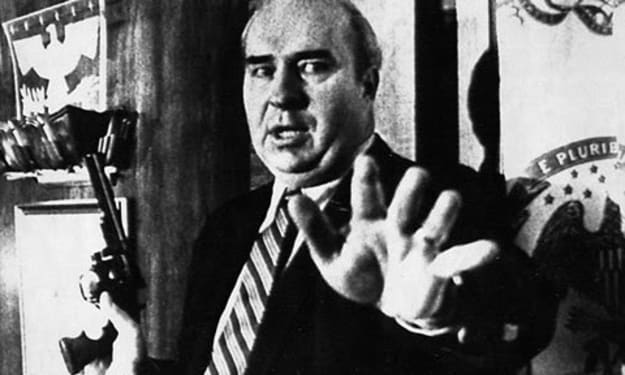



Comments
There are no comments for this story
Be the first to respond and start the conversation.